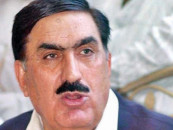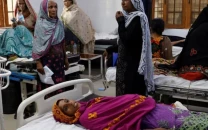Healthcare tips: More children can survive if mothers breastfeed
Pakistan is signatory to a WHO convention that tasked govts to promote breastfeeding.

Bottled milk, on the other hand, is one of the major causes for malnutrition among infants. PHOTO: FILE
Infant mortality incidents in the country can decline by up to 15 per cent if mothers breastfeed their children, which reduces the chances of babies contracting diarrhea, measles and other diseases. Bottled milk, on the other hand, is one of the major causes for malnutrition among infants.
Dr D S Akram, chairperson of the Health Education and Literacy Programme (HELP), argued that the government should amend the relevant laws to prohibit promotion of substitute products. “Promotion of breast feeding substitutes is a crime all over the world,” said Dr Akram, during a press conference on Tuesday.
Dr Akram argued that her proposals weren’t that drastic, as the World Health Organisation (WHO) had enacted a Code of Marketing of Breast Milk Substitutes in 1981, “to protect and promote breastfeeding”. The code recommended that governments place restrictions on the marketing of various breast milk substitutes, such as infant formulae, to ensure that mothers are not discouraged from breastfeeding. Pakistan was among 118 countries that voted in favour of adapting the code. Its recommendations were then included in the Protection of Breastfeeding and Child Nutrition Ordinance, which was promulgated in October 2002.

However, after the health sector was devolved to the provinces, there was a need for provincial assemblies to incorporate the components of the code into their own law books. “With help of lawmakers, we hope that the [Sindh] government would table the bill in the next assembly session,” said Akram.
She added that many lawmakers, including Sindh Assembly speaker Nisar Khuhro, were in favour of adapting the law.
Pakistan has one of the lowest breastfeeding rates, and also the highest bottle-feeding rates, among South Asian countries, said the HELP chairperson. Khyber Pakhtunkhwa has the highest breastfeeding rate in the country, while Punjab has the lowest. “The country spends a huge amount of foreign [currency reserves] on importing milk formulae.” There is also no control on the content that companies use for advertising, which influences the way mothers think about the issue, said Akram.
Dr Fehmida Arif, head of the paediatric department at Dow University of Health Sciences, said that breastfed babies were less likely to suffer from diabetes, cancer, asthma and allergies in the future, and were also likely to have a higher IQ level.
With additional information by PPI
Published in The Express Tribune, January 30th, 2013.


















COMMENTS
Comments are moderated and generally will be posted if they are on-topic and not abusive.
For more information, please see our Comments FAQ